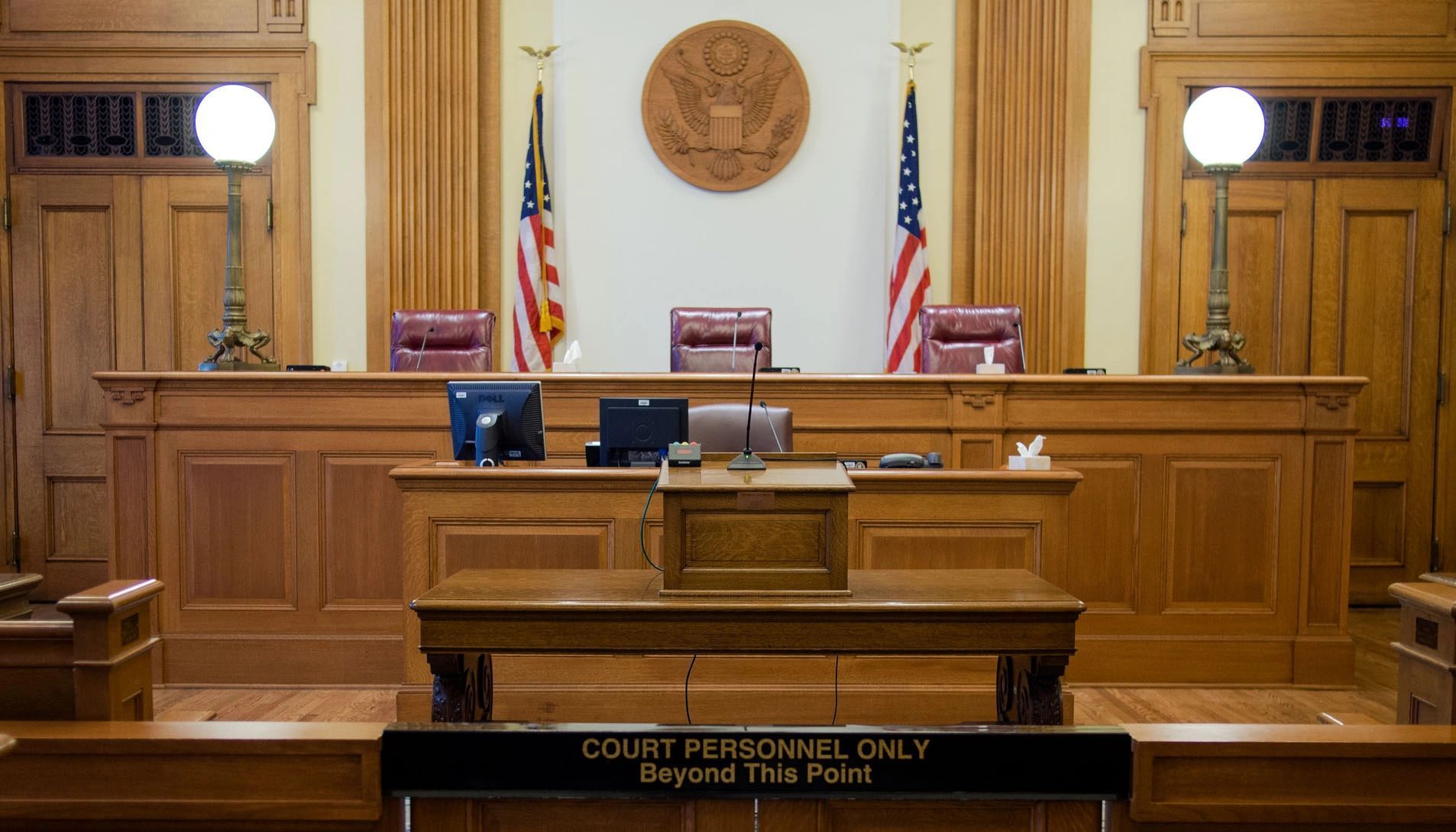BLOG
Stay informed by reading our blog, where we share the latest legal updates, tips, and expert insights. It's a valuable resource to help you better understand your rights and options.
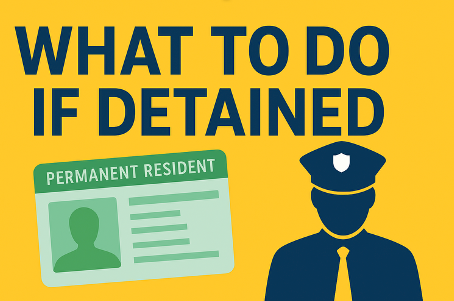
Like all international travelers, lawful permanent residents (LPRs)—also known as Green Card holders—are subject to inspection by U.S. Customs and Border Patrol (CBP) when arriving at an airport or land port of entry. While LPRs enjoy greater rights than nonimmigrants when returning to the United States after travel abroad, all noncitizens now face increased scrutiny at the border for past immigration issues, interactions with police, and political activity. It is important that you know your rights when returning to the United States. Returning Resident vs. Arriving Alien As an LPR, CBP will screen you to decide whether you are a “returning resident” or an “arriving alien”. If CBP decides that you are a “returning resident,” you should be processed quickly and admitted to the United States. However, CBP will consider you an “arriving alien” if it decides that you have: Abandoned or given up your LPR status; Been absent from the U.S. for a continuous period of more than 180 days; Engaged in illegal activity after leaving the U.S.; Departed the U.S. while in removal or extradition proceedings; Committed certain criminal offenses, unless you were granted an immigration waiver; or Are trying to enter without inspection. Secondary Inspection If questions arise and CBP is unable to admit you quickly, you may be taken to a separate area for “secondary inspection.” Being sent for a secondary inspection by itself does not necessarily mean you are in trouble, but you may be held anywhere from a few minutes to several hours or longer. During secondary inspection, CBP will determine whether you should be allowed to enter the United States. During secondary inspection: CBP may ask questions, run checks, and collect your biographic and biometric data (such as fingerprints and photographs). Your phone, laptop, or other electronic devices may be searched and kept temporarily. Searches may include screening of your social media activity. In some cases, devices may be held and returned later. Please see our Electronic Device Search Flye r for more information. You may request a receipt for your devices if taken by CBP. You may be detained if CBP has concerns about your admissibility. Warning About Form I-407: Abandonment of LPR Status CBP may ask you to sign Form I-407, Record of Abandonment of Lawful Permanent Resident Status. DO NOT sign this form unless you have spoken to a lawyer. Form I-407 must be signed voluntarily. It is important to know that: You cannot lose your LPR status because of time spent outside the U.S. without being allowed to have an immigration judge review a presumption of abandonment. The government must prove abandonment of LPR status by clear, unequivocal, and convincing evidence in removal court proceedings. CBP cannot do this at the border. If you refuse to sign Form I-407, CBP must issue you a Notice to Appear for immigration court. If CBP takes your green card, you may request evidence of your status by stamping your passport. If they refuse, you may schedule a USCIS appointment to request an I-551 stamp in your passport as proof of your status. If You Are Detained – Know Your Rights If CBP believes you are inadmissible or you refuse to sign a Form I-407, you may be detained overnight or transferred to immigration detention. You still have the following rights: You have the right to contact your consulate. The consulate can help you contact a lawyer or family member. You may ask to speak with a lawyer. CBP may deny access to a lawyer, but it is worth asking for the record. You have the right to remain silent and not sign any documents without legal advice, especially if you notice errors in the documents or do not agree with their content. You have the right to review all written statements that are prepared for you, in a language that you can understand. You have the right to ask for an interpreter if you do not fully understand the questions being asked or the documents you are given. Do not sign anything you do not understand. Right to an Immigration Judge If CBP claims that you are removable, you have the right to a hearing before an immigration judge. Do not waive this right. An immigration judge—not CBP—must decide if your green card status can be taken away. Questions About Politics, Religion, or Activism CBP may ask about your political beliefs, associations, or participation in protests. You do not have to answer questions about protected First Amendment activity. You may decline to respond to inappropriate questions. Before You Travel Consult an immigration lawyer before traveling if: You have a criminal record—even for minor offenses/arrests—or a pending criminal case. You have pending applications with USCIS or immigration court. You have past immigration violations or challenging interactions with CBP. You are a conditional resident. Important Reminders Travel with the contact information for your lawyer and your consulate on a separate paper. Let your family know your travel plans and check in when you land. If detained, try to contact a lawyer or have someone advocate for you. In some instances, having a Form G-28 signed by your immigration lawyer in hand can be helpful. For additional legal support and a review of your case, please contact our office.

On August 15, 2025 , U.S. Citizenship and Immigration Services (USCIS) issued a new policy memorandum, “Restoring a Rigorous, Holistic, and Comprehensive Good Moral Character Evaluation Standard for Aliens Applying for Naturalization. ” This policy represents a major shift in how USCIS officers will evaluate whether applicants meet the good moral character (“GMC”) requirement for naturalization. Why This Matters Naturalization is more than paperwork—it is the legal transformation of becoming a full member of American society. One of the central requirements is showing that you are a person of good moral character during the statutory period, typically the last 3 or 5 years depending on your case. Until now, and depending on the specifics of one’s case, many GMC evaluations had followed a “checklist” approach: if you avoided certain disqualifying crimes, you were presumed eligible. The new policy restores a totality of the circumstances approach, meaning officers will consider both positive and negative factors in your life when deciding if you meet the standard. What USCIS Will Consider Positively The memo instructs officers to give weight to applicants’ affirmative contributions to society , not just the absence of wrongdoing. Positive factors include: Sustained community involvement and volunteer service Family caregiving responsibilities and strong family ties in the U.S. Educational attainment Stable employment and career achievements Long residence in the U.S. Compliance with taxes and financial obligations What Could Disqualify an Applicant Certain acts will continue to trigger permanent or conditional bars to good moral character, such as: Permanent bars: Murder, aggravated felonies, torture, genocide, and severe human rights violations. Conditional bars: Controlled substance offenses, multiple DUI convictions, false claims to U.S. citizenship, unlawful voting, and similar offenses. Other misconduct, even if technically legal, that falls short of community standards (e.g., repeated reckless driving, harassment, or other irresponsible behavior). Rehabilitation and Second Chances A key part of this new framework is recognizing rehabilitation . USCIS officers are directed to consider evidence that an applicant has taken steps to correct past mistakes. Examples include: Paying back taxes or overdue child support Successfully completing probation or court-ordered programs Letters of support from community members Demonstrating mentoring or service that reflects personal growth What This Means for Applicants This new standard gives applicants more room to tell their full story . For those with past mistakes, it opens the door to show rehabilitation, responsibility, and positive contributions. For those with clean records, it means their community involvement, family dedication, and civic responsibility will be recognized as affirmatively demonstrating good moral character. At the same time, the holistic review also means greater scrutiny —officers may probe deeper into behavior and lifestyle, not just criminal history. Applicants should be prepared to present evidence of both compliance with the law and affirmative good deeds. Final Thoughts This shift signals that USCIS views citizenship as more than a legal formality—it is a reflection of character, responsibility, and community belonging. If you are considering naturalization, now more than ever it is important to document your positive contributions and be prepared to address any past challenges honestly and with evidence of rehabilitation.
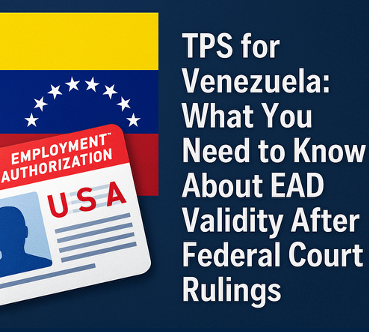
Court Orders, DHS Vacaturs, and Legal Confusion—What’s Going On? Over the past few months, TPS recipients from Venezuela—particularly those covered under the 2023 redesignation—have faced enormous legal uncertainty. On February 5, 2025, DHS Secretary Kristi Noem vacated the 2023 TPS redesignation, effectively stripping many Venezuelans of their TPS status and terminating their employment authorization. This policy shift was immediately challenged in federal court by the National TPS Alliance. On March 31, 2025, Judge Edward Chen of the Northern District of California temporarily blocked the termination, preserving TPS and work authorization for hundreds of thousands of Venezuelans. However, on May 19, 2025, the U.S. Supreme Court granted the government’s emergency request to stay Judge Chen’s order, allowing DHS’s termination of the 2023 TPS designation to move forward—at least temporarily. This created mass confusion for beneficiaries, employers, and legal practitioners. What the Federal Court Clarified on May 30, 2025 In a subsequent ruling on May 30, 2025, the federal court clarified that Venezuelan TPS recipients under the 2023 designation who had received TPS documentation on or before February 5, 2025—including EADs, Form I-94s, and I-797 Notices—will retain their TPS status and work authorization pending final resolution of the case. The court ordered DHS to postpone the effective date of its termination decision for those individuals. As a result, many Venezuelan nationals who applied early and received their documentation before the February deadline still have valid TPS and EADs, with expiration dates listed as late as October 2, 2026. USCIS Clarifies EAD Validity for TPS Venezuela Recipients USCIS has issued guidance aligning with the court order and confirming EAD validity for certain Venezuelan TPS holders. Here's how to determine whether an EAD remains valid:
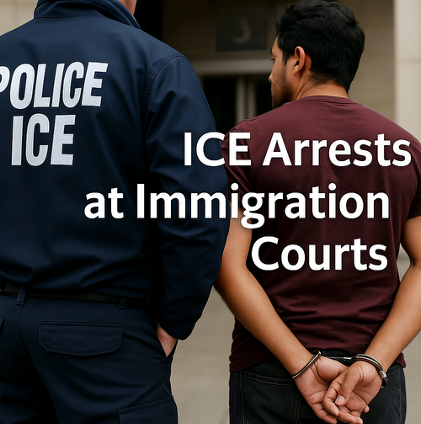
ICE Arrests After Court Hearings: A New Enforcement Pattern Starting in May 2025, ICE (U.S. Immigration and Customs Enforcement) began arresting noncitizens immediately after they attended their immigration court hearings. These arrests typically occur as individuals are leaving the courthouse—sometimes even after the government has moved to dismiss their immigration court case. This shift has major implications for noncitizens, their families, and advocates alike. Who Is at Risk? ICE is targeting individuals for arrest outside immigration courts, including those: With pending hearings in removal proceedings Whose cases have been dismissed by an immigration judge Who entered the U.S. without inspection and cannot prove two years of continuous presence Whose humanitarian parole or CBP One parole has been revoked or expired What Is Expedited Removal? Expedited removal is a fast-track deportation process where a person: Does not appear before an immigration judge Can be deported in as little as 24 hours Is barred from reentering the U.S. for five years May face long-term consequences for future immigration petitions How Can You Protect Yourself? You are generally NOT subject to expedited removal if you: Entered the U.S. legally (with a visa, even if now expired) Can show two or more years of continuous residence in the U.S. Are an unaccompanied minor under age 18 Are a Cuban national who arrived by plane Important: If your parole has ended, you may be subject to expedited removal even if you’ve lived in the U.S. for years. Documents That Can Help You Prove Two Years of Residence Carry photocopies (not originals) of: Lease or rental agreements Utility bills or bank statements covering two years Medical, school, or employment records Mail postmarked more than two years ago Keep these documents in a clearly labeled folder and bring them to court. If You Are Afraid to Return to Your Country Tell ICE officers the following statements clearly: “I am afraid to return to my home country.” “I would like a credible fear interview.” “I fear persecution or torture.” Using these exact words may pause the expedited removal process and give you a chance to apply for asylum or related protection. Before You Sign Any Paperwork from ICE NEVER sign anything labeled: Voluntary Departure Stipulated Removal Waiver …without speaking to a lawyer. These can result in immediate deportation. If Your Case Is Being Dismissed in Immigration Court Ask the judge: Why is the government dismissing my case? What has changed since my last hearing? What happens to me if this case is closed? You can also request: That DHS submit the dismissal request in writing 10 days to respond to the motion Time to consult an attorney If You Are Detained by ICE You still have rights: The right to remain silent The right to speak to an attorney The right to contact your consulate The right to refuse home entry without a signed judicial warrant Emergency Preparation Tips Save key numbers in your phone (attorney, consulate, emergency contacts) Discuss custody arrangements for children and store important documents in a safe place Have emergency funds available Let trusted family or friends know your court date and check in with them afterward Helpful Contacts Emergency Legal Help: 2150# or (202) 442-3363 Court Date Line: 1-800-898-7180 Family Support Hotline: 1-855-435-7693 Locate Detained Individuals: ice.gov/odls Legal Challenges Underway Civil rights groups have filed lawsuits—Make the Road NY v. Noem and CHIRLA v. Noem—challenging the legality of courthouse arrests. Until there is a ruling, preparation is your best protection. Need Help? We’re Here for You. If you or a loved one has an immigration court date approaching, or you’ve received a notice of case dismissal, consult an immigration attorney immediately. Our office is here to protect your rights and help you avoid detention and deportation.
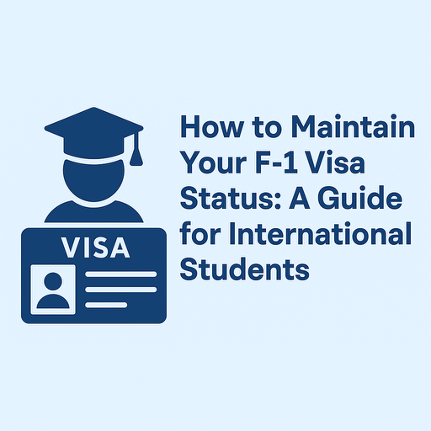
Understanding the Responsibilities of F-1 Students For international students in the U.S. on an F-1 visa, maintaining lawful immigration status is critical. Failure to follow visa regulations can result in serious consequences, including termination of SEVIS records, loss of work authorization, or even removal proceedings. Here’s what every F-1 student needs to know to stay compliant and safeguard their academic and immigration future. Maintain Valid Documentation at All Times F-1 students must keep the following immigration documents current and accessible: All issued Forms I-20 from your school’s Designated School Official (DSO) Passport valid for at least six months into the future I-94 record showing “F-1” status and “D/S” (Duration of Status), which covers your academic program, any approved practical training, and a 60-day grace period after program completion Stay Enrolled and Meet Academic Requirements F-1 students must: Attend the school listed on their I-20 Maintain full-time enrollment (at least 12 credit hours for undergraduates, 9 credit hours for graduate students) Limit online classes—only one 3-credit online course may count toward full-time enrollment each semester Obtain prior approval before dropping below full-time status Remain in good academic standing Update Your DSO on Program and Personal Changes You must notify your DSO within 10 days of any of the following: Change in major, degree level, or funding source Change of address or phone number Legal name change Also, if you need additional time to complete your degree, you must request an I-20 extension before your current I-20 expires. Follow the Rules for Employment F-1 students are only allowed to work under specific conditions: On-Campus Employment: Allowed up to 20 hours/week during the semester and full-time during school breaks Off-Campus Employment: Requires DSO authorization and must be part of CPT (Curricular Practical Training) or OPT (Optional Practical Training) CPT must be directly related to your major and appear on your I-20 OPT requires an approved EAD (Employment Authorization Document) before you begin working STEM OPT: Students with degrees in qualifying STEM fields can apply for a 24-month OPT extension Severe Economic Hardship: Students facing unexpected financial difficulty may request special work permission Traveling as an F-1 Student Before you travel internationally: Confirm that your SEVIS record is active Ensure your DSO’s travel signature on your I-20 is less than 12 months old Avoid travel if you have a pending OPT or STEM OPT application Carry your passport, visa, signed I-20, and EAD (if applicable) when re-entering the U.S. Be prepared for secondary inspection and possible electronic device searches by CBP officers F-2 Dependents F-2 spouses and children must also maintain status. They cannot work, and may only study part-time in certain programs. All address changes must be reported to both your DSO and USCIS within 10 days. What Happens If You Lose Status? Violation of F-1 visa rules can result in termination of your SEVIS record. You could become removable from the U.S., even if your visa has not been physically canceled. If your visa is revoked or SEVIS terminated: Consult an immigration attorney immediately Gather your full immigration history, including: All I-20s, I-94 travel history, passport scans, visa pages, EADs (front and back) Sign a FERPA release and ICE privacy waiver (Form 60-001) if someone is helping you navigate the process Final Reminders Stay enrolled full-time and maintain good communication with your school’s international student office Depart the U.S. within 60 days of program completion unless you apply for OPT, change status, or transfer Talk to your DSO before making changes to your academic or visa situation For legal guidance, consult a licensed immigration attorney Need Help Navigating Your F-1 Responsibilities? We help international students remain compliant with immigration law and explore pathways to work authorization, status changes, or permanent residency. If you have questions about your rights or options as an F-1 student, reach out to us today.

Introduction: A Chilling Shift in Citizenship Policy In a move drawing concern from immigration lawyers and civil liberties advocates alike, the Department of Justice (DOJ) recently announced that denaturalization—the process of stripping individuals of their U.S. citizenship—will be a top enforcement priority under the current administration. While denaturalization has long existed as a legal tool for extreme cases (such as war crimes or fraud), its expanded use under the Trump administration signals a dangerous departure from past practice and a potential threat to due process and civil stability. What Is Denaturalization? Denaturalization is the legal process of revoking U.S. citizenship from a naturalized citizen. It can occur via: Civil litigation filed by the DOJ in federal court, or Criminal proceedings when naturalization fraud is prosecuted under 18 U.S.C. § 1425. The government must prove its case with “clear, unequivocal, and convincing evidence”—a high legal standard, but one that’s now being applied more broadly. What Grounds Can the Government Use to Denaturalize Someone? Under the law (8 U.S.C. § 1451), denaturalization is only permitted when: Citizenship was obtained through fraud or material misrepresentation. The person joined subversive groups (e.g., communists or anarchists) within 5 years of naturalization. The person’s citizenship was derived from a parent or spouse whose own naturalization was revoked. The individual committed naturalization fraud and was convicted in criminal court. Citizenship was granted through military service but the person was later dishonorably discharged. The person refused to testify before Congress about subversive activities. What’s New—and Why It’s Troubling A June 2025 DOJ memo has broadened the categories of individuals prioritized for denaturalization, now including: Anyone DOJ deems “sufficiently important to pursue.” Those with pending criminal charges—even without a conviction. Individuals accused of financial fraud, corruption, or affiliations with gangs. Citizens considered a “potential danger to national security”—a vague term with no clear definition. These vague priorities open the door for politicized targeting and potentially unconstitutional enforcement. What Are the Risks to Naturalized Citizens? The consequences of this policy shift are significant: Citizens may be investigated based on minor administrative errors, such as typos on forms. Civil denaturalization proceedings offer no right to a public defender. Cases can be filed and adjudicated without the individual’s knowledge. Once denaturalized, individuals can become stateless, losing the right to work, travel, or receive public benefits. Can U.S.-Born Citizens Be Stripped of Citizenship? Rarely. U.S.-born citizens are protected by the Fourteenth Amendment, and denaturalization is not applicable. However, expatriation—the loss of citizenship through certain voluntary acts—can apply, but only under limited and clearly defined circumstances. The government must prove such acts were done voluntarily and intentionally. Legal Precedent Supports Citizenship Security The Supreme Court has historically limited government power to revoke citizenship: Trop v. Dulles (1958): Denaturalization as punishment violates constitutional protections. Afroyim v. Rusk (1967): Citizens cannot be involuntarily stripped of citizenship. Schneiderman v. United States (1943): Citizenship should not depend on political pressures or “the temper of majority thought.” What Immigrants Should Do Now If you are a naturalized U.S. citizen: Ensure your immigration history and application records are accurate and complete. Keep copies of all your naturalization paperwork. Avoid disclosing personal information on public platforms that may be misconstrued. Contact an immigration attorney if you have concerns about prior filings or alleged misrepresentations. Conclusion: Citizenship Should Be Final Weaponizing denaturalization undermines public trust in the immigration system and chills civic participation by immigrants. Citizenship is not conditional—it is a legal status granted through a solemn oath and governed by the Constitution and federal statute. Our firm stands ready to defend your rights. If you believe you may be at risk of denaturalization or have received a notice from USCIS or DOJ regarding your citizenship, please contact us immediately.
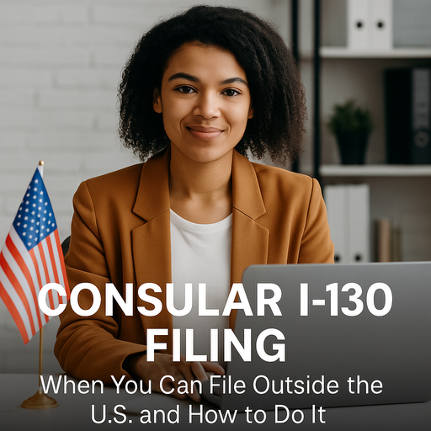
What Is a Consular I-130 Filing—and When Is It Allowed? In most cases, U.S. citizens seeking to bring their spouse, parent, or child to the United States must file Form I-130 (Petition for Alien Relative) with USCIS inside the U.S. But what if the U.S. citizen and the beneficiary are both outside the U.S. and face an emergency? In rare, urgent situations, the U.S. Department of State (DOS)—through its consulates and embassies abroad—can accept and adjudicate I-130 petitions locally. This is known as “consular filing.” But here’s the catch: this process is only available in exceptional or emergency circumstances, and it’s up to the consulate to accept or reject the case. When Can You File an I-130 at a U.S. Consulate? The U.S. Citizenship and Immigration Services (USCIS) allows DOS to accept a local I-130 filing if: The petitioner is a U.S. citizen, and The situation meets exceptional circumstances, or The case falls under a temporary or blanket authorization by USCIS. The consular officer has discretion to accept or deny the request. You cannot appeal their refusal. Examples of Exceptional Circumstances According to USCIS guidance, some qualifying emergencies include: Military Emergency Medical Emergency Threats to Safety Child Aging Out Recent Naturalization Adoption Short-Notice Job Relocation Temporary Blanket Authorizations USCIS occasionally grants blanket authorization for consular I-130 filings during major crises, such as: Wars or natural disasters Deployment of U.S. military personnel stationed on overseas military bases Important Limitations You cannot use consular I-130 filing just to speed up processing. Specifically: You can’t travel abroad just to file locally. If you already filed an I-130 with USCIS, you can’t file a second one abroad—unless you withdraw the first (and even that may not work). What About Location and Presence Requirements? The petitioner and beneficiary must both be physically present in the consular district. The petitioner must appear in person at the consulate for the filing. The beneficiary must be able to remain legally in the host country throughout visa processing. While the petitioner doesn’t have to live in that country long-term, local residency may help strengthen the request. Not All Embassies Handle Filings the Same Way Each U.S. consulate has its own intake procedure. Examples: Australia: Requires an email request with the signed petition and evidence, followed by an in-person appointment. United Kingdom: Uses an online contact form first; then requests documents and may schedule an appointment. Some posts are flexible—others are very strict. It helps to submit a detailed personal declaration explaining the urgency and potential consequences. How Are Consular I-130 Petitions Adjudicated? If the petition is clearly approvable, the consular officer may approve it on the spot. If not, they forward it to the appropriate USCIS service center. Once approved, the case skips the National Visa Center (NVC) and goes straight to consular processing, where the beneficiary files a DS-260 and prepares supporting documents. Key Takeaways Consular I-130 filing is for rare, urgent, and time-sensitive cases. Each U.S. embassy or consulate has different procedures. You cannot appeal a consulate’s decision not to accept your case. If denied, you may still file a traditional I-130 with USCIS and request expedited processing. Need Help with a Consular I-130 Filing? At The Law Office of Jasmyn Kamal, we help families navigate urgent immigration matters with speed and care. If you’re abroad and facing an emergency, or wondering if you qualify for consular I-130 filing, contact us today.

Encounters with Immigration and Customs Enforcement (ICE) can be stressful, but being informed can make all the difference. This post provides a step-by-step guide on what to do if ICE approaches you at home, work, or in public. Learn how to verify their authority, exercise your right to remain silent, and protect yourself and your family. The post also includes downloadable informational flyers and "Know Your Rights" cards in both English and Spanish to help you stay prepared and share vital information with your community.





